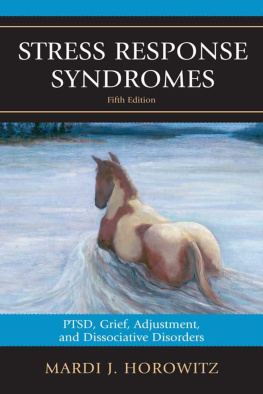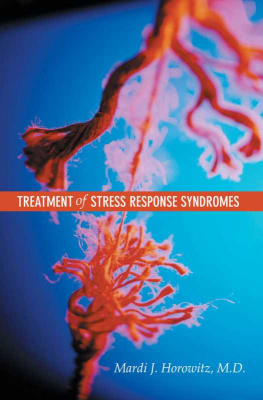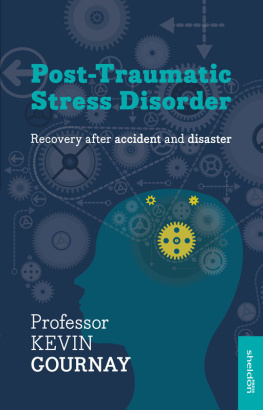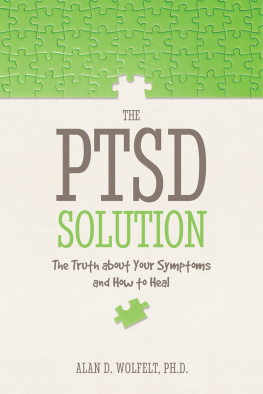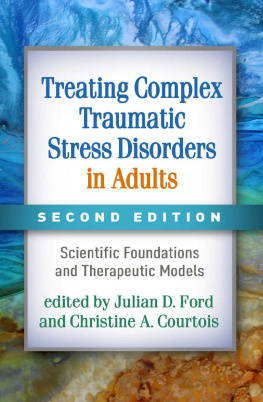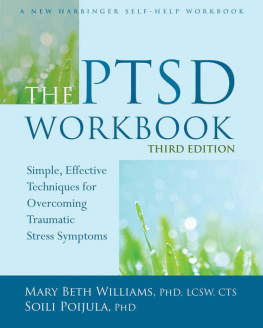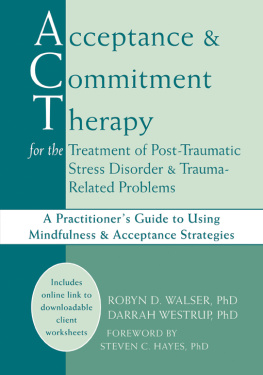Stress Response Syndromes
Stress Response Syndromes
PTSD, Grief, Adjustment, and Dissociative Disorders
Fifth Edition
M ardi J. H orowitz , md
JASON ARONSON
Lanham Boulder New York Toronto Plymouth, UK
Published by Jason Aronson
A wholly owned subsidiary of The Rowman & Littlefield Publishing Group, Inc.
4501 Forbes Boulevard, Suite 200, Lanham, Maryland 20706 http://www.rowmanlittlefield.com
Estover Road, Plymouth PL6 7PY, United Kingdom
Copyright 2011 by Jason Aronson Publishers, Inc.
All rights reserved No part of this book may be reproduced in any form or by any electronic or mechanical means, including information storage and retrieval systems, without written permission from the publisher, except by a reviewer who may quote passages in a review.
British Library Cataloguing in Publication Information Available
Library of Congress Cataloging-in-Publication Data
Horowitz, Mardi Jon, 1934
Stress response syndromes : PTSD, grief, adjustment, and dissociative disorders /
Mardi J. Horowitz 5th ed. p. cm.
Summary: I kept the well-supported assertions from the earlier edition and added essential new information. The most important changes involved diagnostic considerations as we head for DSM-V and ICD-11. Treatment suggestions are updated with more attention to the formulations needed for helping complex, real world cases. I also updated the emotional information processing theory.Provided by publisher.
Includes bibliographical references and index.
ISBN 978-0-7657-0839-7 (hardback)
1. Post-traumatic stress disorder. 2. Post-traumatic stress disorderCase studies. I. Title.
RC552.P67H67 2011
616.8521dc23 2011021748
^TM,
The paper used in this publication meets the minimum requirements of American National Standard for Information SciencesPermanence of Paper for Printed Library Materials, ANSI/NISO Z39.48-1992. Printed in the United States of America
For those strangers who, roused by a shared sense of humanity, help others overcome difficult events, providing compassion, restoration, and hope.
And, more personally, in loving memory of Lillian and Morris Horowitz, who taught me compassion, restoration, and hope.
Contents
viii CONTENTS
PART FOUR: CLINICAL EXAMPLES
Foreword to the First Edition
This book by Dr. Mardi Horowitz on the psychological understanding and the psychotherapeutic amelioration of specifically circumscribed psychopathological entities, the Stress Response Syndromes, is an exciting and long-needed investigation that reflects the creative interplay of psychotherapy, research, and practice. It is, after all, of the essence of the clinical, medical, and health disciplines, the so-called healing arts, of which psychotherapy partakes, that continuing advance in understanding and in practice should accrue from the effective and creative interplay of formal research, basic investigationin theoretical structure, in experimental laboratory, or in field observation or surveyin interplay with the clinical experience and clinical reflection of the bedside, or in our instance, the consulting room. It is this creative interplay between research and practice, leading to the enhancement of both, which has been so underdeveloped in our peculiar science with its heretofore essentially one-sided development of clinical insight and understanding without the signal benefit of concomitant growth from the formal and systematic research side of any comparable insight and understanding.
Mardi Horowitzs book is a multifaceted model, or rather a series of models, paradigmatic of a new genre, that brings psychotherapy research meaningfully into the clinical picture; that is, where each influence furthers the other. What is the nature then of these models? There is first a model of problem setting and problem delineation in the field of psychological understanding and psychological intervention. Through a sequence (1) of typical clinical case history in sufficient detail; (2) of equally detailed and at the same time wide-ranging field observation and survey drawing upon disaster and extreme circumstance, whether wartime military combat or peacetime fire or shipwreck, whether such inhumane extreme circumstances as concentration camps and nuclear holocaust or more everyday circumstances of rape, severe illness, death and bereavement; and (3) of equally meticulous attention to the varieties of ingenious analogies to these stress situations, to the extent that they can be ethically re-created within the experimental laboratory and there be safely studied via controlled manipulation of critical dimensions; through this sequencing and drawing of common threads, this book serves as a model for the use of consulting room, of field observation, and of experimental laboratory to throw complementary and therefore incremental illumination upon the essential problem of psychotherapy, the understanding and the possibilities for intervention into the psychological dysfunctions of people.
This volume is secondly a model for the rational description of the natural history of a psychopathological syndrome, a description, that is, of what Dr. Horowitz calls the general theory, the psychological explanation of sequentially unfolding phases and the general principles of psychological management and psychotherapeutic intervention specifically and differentially appropriate to the specific developmental phase and state of the disorder. This effort brings some rational order out of what so often looks like a chaotic welter of conflicting claims and competing approaches all vying for consumer acceptance in the unregulated psychotherapy marketplace. And thirdly, really as corollary to the general theory that accounts for the understanding and the psychotherapeutic modification of the naturally unfolding stress response syndrome, is the model for differentiated understanding and intervention based on the differing personality types or styles as they differently mesh with the impositions and implications of the syndrome and the requirements and possibilities of the intervention strategies.
Robert S. Wallerstein, M.D., Professor of Psychiatry University of California, San Francisco
Preface to the Fifth Edition
I kept the well supported assertions from the earlier edition and added essential new information. The most important changes involved diagnostic considerations as we head for DSM-V and ICD-11. Treatment suggestions are updated with more attention to the formulations needed for helping complex, real world cases. I also updated the emotional information processing theory.
In Part I we examine the core characteristics of stress response syndromes. Part II explains these general response tendencies and describes the principles of treatment for stress-induced disorders. Part III elaborates on these principles, contrasting patient types. Then Part IV presents case histories, including transcripts of sections of the psychotherapeutic process, to further illustrate how personality factors and preexisting conflicts contribute to how a person reacts to a traumatic event.
Mardi Horowitz, M.D.
San Francisco, California
Acknowledgments
In my introduction to the first edition, I thanked my high school chemistry teacher, Mr. Toon, for giving me the gift of wanting to study science, and UCSF professor Jurgen Ruesch for pointing the way in psychiatric research. Many other mentors and colleagues have guided me since then. In this edition I cannot list all the colleagues, teachers, patients, and students who have made vital contributions. But certainly important among these are my colleagues Rene Binder, George Bonnano, Nigel Field, Are Holen, Nancy Kaltreider, Charles Marmar, Connie Milbrath, Martha Shumway, Bryna Siegel, Charles Stinson, Robert Wallerstein, Daniel Weiss, Nancy Wilner, Eva Suntin and Hansjrg Znoj.
Next page
